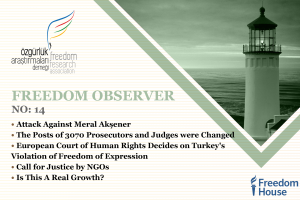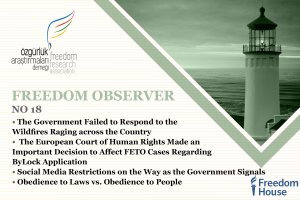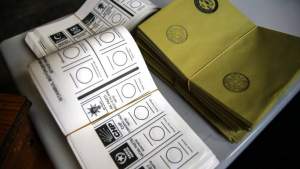
From Editor-in-Chief
Although we have not seen you on these pages for about three weeks due to a break in the Freedom Observer for the holidays, there have been no significant developments in Turkish politics during this time. Some of the developments that did occur were merely continuations or extensions of existing or ongoing political agendas in the country.
Foremost among these developments is the end of the “détente” between the AKP wing of the government and the main opposition CHP, which seemed to have begun about two months ago and could have helped normalize general politics. In his speech at his party’s last group meeting, President and AKP leader Tayyip Erdoğan said, “We stand with our ally, and we are united. We walk shoulder to shoulder with our companion. We will confront insidious plans and attacks together,” sending a clear message to MHP leader Bahçeli that their partnership would continue and that they were not seeking an alliance with the CHP.
The political implication of Erdoğan’s statement, coming after Bahçeli’s “all-out” “if that’s the case, go and form an alliance with the CHP,” is evident: Erdoğan’s party is compelled to partner with the MHP. Meanwhile, Bahçeli’s harsh language towards the opposition suggests that a condition for the AKP-MHP partnership is that Erdoğan must maintain a “hostile” relationship with the opposition, let alone a civilized one. That this message was received by his interlocutor is evident from Erdoğan’s undeservedly harsh criticism of the CHP in the speech, highlighting the insincerity of his attempt at dialogue with the CHP.
It is also noteworthy that it is not only Erdoğan’s friendly relations with the main opposition party that disturb MHP supporters, as Bahçeli’s statement suggests. AKP leader Erdoğan’s contact with the widow of the deceased, indicating a sincere interest in the murder of Sinan Ateş, concerned the MHP community at least as much as his attempts to soften relations with the CHP. This must be the main reason for the harshness in Bahçeli’s tone.
In any case, it seems that the normalization of Turkish politics, especially in terms of power-opposition relations, in a manner befitting a civilized and democratic country, if such a thing is to happen, will have to wait for another spring.
On the other hand, it is widely known that in the last years of the AKP rule (we can also say AKP-MHP rule), one of the constant items on Turkey’s agenda has been the routine human rights violations and the government’s persistent refusal to fulfill the requirements of the ECtHR’s violation judgments. So Turkey has reached such a critical threshold that it deserves to be expelled from the Council of Europe. But alas, Turkey continues to commit human rights violations on the same issues and refuses to comply with the ECtHR’s judgments finding violations.
It is well known how the legal and political developments regarding Osman Kavala and Selahattin Demirtaş have progressed and to what point they have reached.
Another example of Turkey’s disregard for human rights, the rule of Law, and fair trials is the case of Tahir Elçi, the President of the Diyarbakır Bar Association, who was killed on November 28, 2015. On June 12, the Court concluded the case, acquitting the three police officers charged with “negligent homicide,” in line with the prosecutor’s request. However, it is a widespread opinion in legal circles that the trial was not conducted fairly and that no serious investigation was carried out to uncover the perpetrator or perpetrators. Indeed, according to Orhan Kemal Cengiz, lawyer for the Elçi family, “All the evidence in this case has been blacked out. It was systematically concealed. Evidence has not been collected in any way.” Meanwhile, the brother of the deceased Elçi claimed that 13 seconds of the camera footage showing the moment Tahir Elçi was shot was missing, that prosecutors threatened some witnesses and forced them to testify against the deceased, and that the Court did not conduct the necessary investigation to solve the case.
Thus, the murder of Tahir Elçi, which took place in front of everyone’s eyes nine years ago, is likely to go unpunished and become part of Turkey’s infamous series of “unsolved murders” if it is not taken seriously and thoroughly investigated at the legal remedies stage. Woe to ordinary citizens in a state and judiciary that do not take the necessary actions to shed light on the murder of even one of its own citizens, who was both a human rights activist and the President of the Bar Association but instead is suspected of wanting to cover up the murder…
Here’s a piece of “good” news: Turkey has finally been removed from the gray list of the Financial Action Task Force on Money Laundering (FATF). This decision is important not only in terms of improving Turkey’s reputation in the eyes of international financial circles and thus paving the way for foreign financing and investments in the country but also in terms of removing a stain of shame from the Turkish government. However, as long as the current political government does not change its insensitive attitude towards the black money issue, in other words, as long as it maintains the mentality of “let the money come into the country, no matter from whom or how,” there is no guarantee that Turkey will not be placed on the same list again in the future.
In this issue, Ali Rıza Çoban analyzes the recent decision of the Constitutional Court, which annulled most of the articles of the decree law issued in 2018 to facilitate the transition to the new government system. Ömer Faruk Şen evaluates the recent exorbitant hike in the exit fee, while Caner Gerek comments on the results of the Istanbul Chamber of Industry’s survey of Turkey’s 500 largest companies.
See you in the next issue.
* Prof. Dr. Mustafa Erdoğan
Constitutional Court’s Annulments on the Change of the Government System
With its decision published in the Official Gazette dated June 4, 20241 , the Constitutional Court has annulled many provisions of Decree-Law No. 703, which facilitated the transition to the Presidential Government System. As it will be remembered, Constitutional Amendment Law No. 6771, which was adopted by the April 16, 2017 referendum, completely changed the government system by making fundamental amendments to the Constitution, replacing the parliamentary government system with a new Presidential system. Paragraph (B) of Provisional Article 21, added to the Constitution by Article 17 of the Constitutional Amendment Law No. 6771, stipulates that the amendments to the Rules of Procedure of the Parliament and other necessary legal arrangements required by the system change shall be made by the Grand National Assembly of Turkey within six months from the publication date of the Law. However, the necessary legal amendments were not made by the Turkish Grand National Assembly within the period stipulated in the Constitution, and the Turkish Grand National Assembly decided to hold early elections in April 2018 and enacted the Authorization Law No. 7142 authorizing the Council of Ministers to issue decrees to make the legal amendments required by the system change after the early elections.
Following the elections held on June 24, 2018, the Council of Ministers adopted Decree-Law No. 703 on July 2, 2018, containing 233 main and 16 provisional articles, and this Decree-Law entered into force after being published in the Official Gazette on July 9, 2018, the day the President was sworn in. Decree-Law 703 also included provisions regulating many issues unrelated to the change in the government system. It should be noted that although this Decree-Law consists of 249 articles, it made a very comprehensive and cumulative change in the legal system as each article envisaged amendments to numerous articles of various laws.
In the annulment lawsuit filed by the Republican People’s Party group, a three-stage argument of unconstitutionality was presented. Firstly, the entire Decree Law, which was issued on the day the Council of Ministers’ term of office and the authorization law expired, is unconstitutional, and therefore, its annulment was requested on the grounds of unconstitutionality. Secondly, it was argued that many provisions of the Decree Law are contrary to the abrogated Article 91 of the Constitution on the grounds that they are not covered by the authorization law or that they regulate issues that the Constitution prohibits from being regulated by a Decree Law. In this context, the annulment of 87 articles of the Decree Law was requested. Thirdly, the annulment of 37 articles was requested on the grounds that they contain provisions substantively contrary to the Constitution.
The Constitutional Court separated the annulment requests regarding 31 different articles of the Decree Law and assigned them different substantive numbers. It examined the case for the other articles and rejected the annulment request for the entire Decree Law. The Court did not interpret Provisional Article 21 (B) of the Constitution as an exclusive authorization and accepted that it was possible to regulate by decree-law. The Court rejected the objections regarding the duration of the Decree Law by not mentioning the publication date of the Decree Law and instead analyzing it based on the date of adoption. However, the publication of the Decree Law is a constitutive element for its effectiveness, and the failure to discuss the scope of the authorization in this respect is a serious deficiency. The Constitutional Court’s rejection of the annulment request for the entire Decree Law is controversial for both reasons.
The Constitutional Court has annulled around 60 different articles of the Decree Law. The annulled provisions span many different laws. The grounds for annulment include the regulation not falling within the scope of the authorization law, regulating areas that cannot be controlled by a decree law, and being fundamentally unconstitutional. It should be noted that the Constitutional Court issued this decision nearly six years later. Nevertheless, the decision revealed that a significant part of the powers used in the new system are unconstitutional. However, this annulment decision did not resolve the problems of unconstitutionality and instead created a more chaotic situation.
The Constitutional Court postponed the entry into force of some annulment decisions on 42 different articles for 12 months. The annulment decisions on 26 different articles entered into force upon the publication of the decision. Some of these annulment provisions directly authorize the President, while others are provisions of the Law repealed by Executive Decree 703. Ordinarily, the TGNA should first make new regulations regarding the annulled provisions that have entered into force and then make the necessary regulations for the postponed provisions within the time limit. However, the TGNA still needs to make the necessary arrangements in response to the Constitutional Court’s annulment decisions. The TGNA’s failure to make the necessary arrangements will create severe gaps in the legal order.
Some of the issues annulled by the Constitutional Court have already been regulated by presidential decrees, and the President has been exercising these powers. However, it is observed that the presidential decrees were issued in place of the provisions of the Law repealed by Decree Law No. 703, even though the Constitutional Court annulled these provisions of Decree Law No. 703. Since the decisions of the Constitutional Court are not retroactive, the provisions repealed by the annulled decrees will not automatically enter into force. If the TGNA does not enact any law, the Constitutional Court’s annulment will have no tangible consequences, and the powers will continue to be exercised in violation of the Constitution. The new regime’s willingness to abide by the Constitution and the Law will be tested again with this decision.
* Ali Rıza Çoban – Constitutional Lawyer
Plans to Raise Exit Fees Abroad
The fee for traveling abroad is expected to be raised significantly. According to the draft regulation first reported by Fırat Kozok of Bloomberg, the fee for traveling abroad, which is 150 TL, is set to increase to 1500 TL in July.2 Some sources claim that the fee could be raised to 3000 TL. Fortunately, it was revealed that the 3000 TL proposal was based on an older document.3 Although the exact percentage of the increase has not yet been finalized, it is certain that there will be an increase much higher than the “revaluation” rate.
As the news of the hike spread on traditional and social media, some citizens thought that buying stamps at the current price would be a solution. However, shortly thereafter, the Revenue Administration announced that stockpiling stamps would not be a solution to avoid the increase: “The departure fee must be paid at the rate in effect on the date of departure. Therefore, buying stamps or paying the fee in advance does not exempt one from paying the rate in effect on the date of departure.”4
Political parties have also raised their voices against this exaggerated hike that has preoccupied the public. IYI Party deputy Kürşad Zorlu submitted a proposal to the Turkish Grand National Assembly to abolish the fee entirely. Hometown Party leader Muharrem İnce asked the government, “For what service is the fee charged to citizens traveling abroad?” CHP leader Özgür Özel said, “They intend to increase the fee for traveling abroad from 150 liras to 3 thousand liras. Everything from needles to threads will see an increase.”
If it rises to 1500 liras, Turkey will become the country that charges its citizens the highest departure fee at approximately 45 dollars. Turkey is already one of the countries with the highest passport fees in the world, and with the significant increase in the departure fee stamp, along with the taxes and fees paid when buying a plane ticket, Turkey will become one of the most expensive countries for its citizens to travel abroad from. The economic crisis, the depreciating Turkish lira, and visa costs are already making it difficult for Turkish citizens to travel abroad, and with this hike, it will become even more challenging.
One of the potential consequences of this would be a reduction in the number of people traveling abroad for vacations, thereby driving demand to the domestic market and ultimately making it more costly to vacation in Turkey, especially on the Mediterranean and Aegean coasts. As is well known, these regions’ accommodation and food and beverage prices are quite high. Many social media users have shared posts showing that the Greek islands are much cheaper and that they have vacationed there for less than in Turkey. Now, with the expected regulation, an exit fee almost as much as the cost of the visa will be added to the cost calculations of these people. In this case, the demand for domestic vacation destinations may increase, causing prices in Turkey to rise even further.
It should also be noted that this draft regulation restricts the freedom of movement of the country’s citizens.5 According to legal expert Gönenç Gürkaynak, this high rate of increase, if implemented, would violate Article 23 of the Constitution. Gürkaynak argues that, even though it is called a fee, there is no definition of a separate public service directly linked to this amount. In other words, Turkish citizens cannot obtain public service by traveling abroad. Therefore, this should be seen as a tax, not a fee.
On the other hand, Article 23 of the Constitution stipulates that the freedom to travel abroad can only be restricted by a judge’s decision due to a criminal investigation or prosecution, preventing citizens from traveling abroad if they do not pay the aforementioned tax amounts to an “unjustified, disproportionate and unjustifiable restriction” of the freedom to travel guaranteed by the Constitution. According to Gürkaynak, this situation may lead to the following scenario: “While those who owe 100 million TL in income tax or who are being sued for 100 million TL for causing public damage can travel abroad without a court ruling, the same constitutional freedom of travel cannot be enjoyed by those who have not paid their departure tax at that moment.
* Ömer Faruk Şen – Ph.D. – Missouri University
What Does ISO 500 Tell Us?
The Istanbul Chamber of Industry has published its 2023 survey of Turkey’s 500 largest industrial companies. According to the results, the sales of ISO 500 companies in 2023 increased by 42% compared to the previous year. It is noteworthy that turnover, which increased by 119% in 2022, grew at a lower rate in 2023. When the turnover data is adjusted for inflation and analyzed in real terms, a contraction of 13% actually emerged. While 25% of sales in production came from the top 10 companies, the share of the top 50 companies was 51.2%. The increase in pre-tax profitability was 32.9%, lower than the increase in turnover. This real decline in turnover and profitability shows that Turkey’s largest industrial companies are now negatively affected by the inflationary environment, contrary to public perception.
Recently, it has been argued that large corporations have been raising prices more than the inflation rate, causing inflation to be higher and thus benefiting from super profits and the inflationary environment. The decline in global demand, the adverse effects of the February earthquake, and the change in economic policies are the main reasons for these results.
On the export side, exports of the 500 largest companies fell by 2.9% in dollar terms to 95.1 billion dollars. Nevertheless, despite the decline in the global recessionary environment, it is evident that they generally performed well. In 2024, the fact that some of the costs of these companies increase at the rate of inflation while their revenues do not increase due to the flat course of the exchange rate will make their exports more difficult. The share of the top 500 companies in total exports was 37%.
Aside from the erosion of profits due to inflation, 96 out of 500 companies announced losses in 2023. In 2022, the number of loss-making companies was 58. The report also emphasizes that companies recorded foreign exchange losses for the first time in a long time. While companies’ profitability is declining, financing costs are increasing rapidly. In 2023, financing costs increased at a very high rate of 92.5%.
As a result of this increase, 56.9% of the companies’ operating profit went to financing expenses. There is a minimal increase of approximately 15 thousand people on the employment side. Still, considering that the companies in question are the largest in Turkey, this is quite insufficient regarding the employment growth Turkey needs.
While the overall data is harmful, the top 500 companies shift their production towards medium-high and high technology. The share of medium-high technology increased from 27.2% to 30.3%, while the share of high technology increased from 6.2% to 7.1%. Thus, the total share of high-tech increased significantly from 33.4% to 37.4%.
Looking at the ISO 500 list in general, the largest company is Tüpraş, which has production sales of 484 billion. The third-largest company, Star Refinery, is also a refinery company. It is seen that 6 of the top 13 companies operate in the automotive sector: Ford Otomotiv, Toyota Otomotiv, Oyak-Renault, Mercedes Benz, Tofaş Otomotiv, and Hyundai Assan Otomotiv. We see a concentration in the largest companies when we add Ereğli and İskenderun Demir Çelik to these companies. Looking at the sectoral distribution of the top 500, 22.5% of the companies operate in the primary metals and machinery manufacturing industry. In contrast, the chemical products, plastics, and rubber products industry accounts for 19.7%, and the land, marine vehicles, and sub-industry for 17.7% of the top 500. There is also a concentration problem in the geographical distribution of the top 500 companies. Istanbul and Ankara are home to 196 of the 500 companies, or roughly 40%.
Gramaltın Kıymetli Madenler Rafineri San. ve Tic. A.Ş. has risen quite rapidly this year, reaching as high as 9th place. Another remarkable situation is that the defense industry climbed up the list. The largest company in the defense industry was TAI, which moved up 13 places to 17th place, while Aselsan moved up one spot to 19th and Roketsan moved up 15 places to 50th.
General ISO 500 Profile
Looking at the ISO 500 list in general, the largest company is Tüpraş, which has production sales of 484 billion. The third-largest company, Star Refinery, is also a refinery company. It is seen that 6 of the top 13 companies operate in the automotive sector: Ford Otomotiv, Toyota Otomotiv, Oyak-Renault, Mercedes Benz, Tofaş Otomotiv, and Hyundai Assan Otomotiv. We see a concentration in the largest companies when we add Ereğli and İskenderun Demir Çelik to these companies. Looking at the sectoral distribution of the top 500, 22.5% of the companies operate in the primary metals and machinery manufacturing industry. In contrast, the chemical, plastics, and rubber industries account for 19.7%, and the land, marine vehicles, and sub-industry for 17.7% of the top 500. There is also a concentration problem in the geographical distribution of the top 500 companies. Istanbul and Ankara are home to 196 of the 500 companies, or roughly 40%.
Gramaltın Kıymetli Madenler Rafineri San. ve Tic. A.Ş. has risen quite rapidly this year, reaching as high as 9th place. Another remarkable situation is that the defense industry climbed up the list. The largest company in the defense industry was TAI, which moved up 13 places to 17th place, while Aselsan moved up one place to 19th and Roketsan moved up 15 places to 50th.
* Dr. Caner Gerek
1AYM, E.2018/117, K.2023/212, 07/12/2023. Karar metnine şuradan erişilebilir: https://normkararlarbilgibankasi.anayasa.gov.tr/ND/2023/212
2https://tr.euronews.com/2024/06/23/yurt-disi-cikis-harcina-10-kat-zam-yeni-vergi-paketinden-cikarilmadi
3https://www.dunya.com/ekonomi/yurt-disi-cikis-harci-3-bin-tlye-mi-cikiyor-gibin-onerisi-eski-cikti-haberi-732976
4https://www.trthaber.com/haber/ekonomi/gibden-yurt-disina-cikis-harci-aciklamasi-yururlukteki-tutarlar-odenmesi-gerekir-863728.html
5https://x.com/GurkaynakGonenc/status/1802249038281998694





